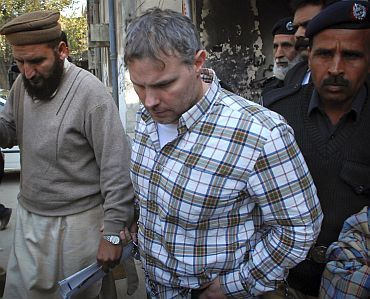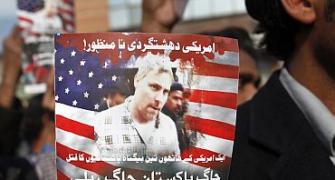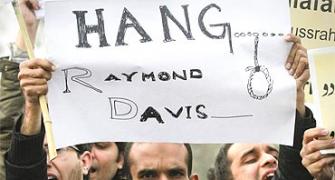 American Central Investigation Agency contractor Raymond Davis, arrested after he shot and killed two Pakistanis in January, was on Wednesday acquitted by a court after the families of the dead men agreed to a blood- money deal and pardoned him.
American Central Investigation Agency contractor Raymond Davis, arrested after he shot and killed two Pakistanis in January, was on Wednesday acquitted by a court after the families of the dead men agreed to a blood- money deal and pardoned him.
Shortly after Additional District and Sessions Judge Yousuf Aujla indicted Davis on murder charges during in-camera proceedings at the Kot Lakhpat Jail, 18 relatives of the dead men appeared in the makeshift court and said they were willing to forgive the American if compensation was paid under the Qisas and Diyat Law.
"The relatives appeared in court and independently told the judge that they had accepted the diyat (compensation) and forgiven him," said Rana Sanaullah, the Law Minister of Punjab province.
"The court then acquitted him. The court proceedings were completed according to the law. The Punjab government didn't talk to anyone and we were not part of this arrangement," Sanaullah said.
Thirty-six-year-old Davis paid Rs 6 crore as diyat to the relatives of the dead men in the presence of the judge, the Geo News channel quoted its sources as saying. However, certain sections of the media said the compensation sum was $ 2.4 million (Rs 10.5 crore). The relatives gave a written undertaking about accepting blood money and asked the judge to free Davis. The judge accepted this and acquitted Davis, the channel reported. Blood money is paid to the next of kin of a murder victim as a fine.
Sanaullah said that under Pakistani and Islamic laws, the relatives of the dead men had the legal right to accept diyat and forgive the accused.
"The government and the prosecutors cannot prevent that. The Punjab government had always said we would accept whatever decision is made by the court," he said. "The government cannot give orders to the judiciary," he added.
Judge Aujla also disposed of another case against Davis for illegal possession of a weapon, saying the time he had spent in prison would be considered as his punishment.
Davis paid a fine of Rs 30,000 in connection with this case on the orders of the court. Media reports said United States officials whisked Davis from the Kot Lakhpat jail soon after he was acquitted by the judge.
There were also reports that he would flown out of Pakistan on a special flight though this could not immediately be confirmed. Sources told PTI that the Saudi Arabian government played a key role in secret negotiations to arrange the blood-money deal to settle Davis' case, which had resulted in Pakistan-US ties plunging to a new low. The Saudi royal family played a key role in convincing Pakistan's radical groups and religious hardliners to agree to the deal, the sources said.
Noted political analyst Najam Sethi said Punjab Chief Minister Shahbaz Sharif had played a "secret role" in getting the families of the dead men to agree to the blood-money deal. "The central government wanted such a deal and it would also be backed by the military," he said.
Davis was arrested in Lahore on January 27 after he shot and killed two armed men he claimed were trying to rob him. The police rejected Davis' claim of acting in self-defence and booked him for murder.
Pakistani leaders, fearful of a backlash due to rising anti-American sentiment, have said the matter should be settled by the courts. The case has been complicated by revelations that Davis was working as a security contractor for the CIA and that the men he killed were operatives of the Inter-Services Intelligence agency.
Image: File photo of Raymond Davis emerging from a Pakistani court








